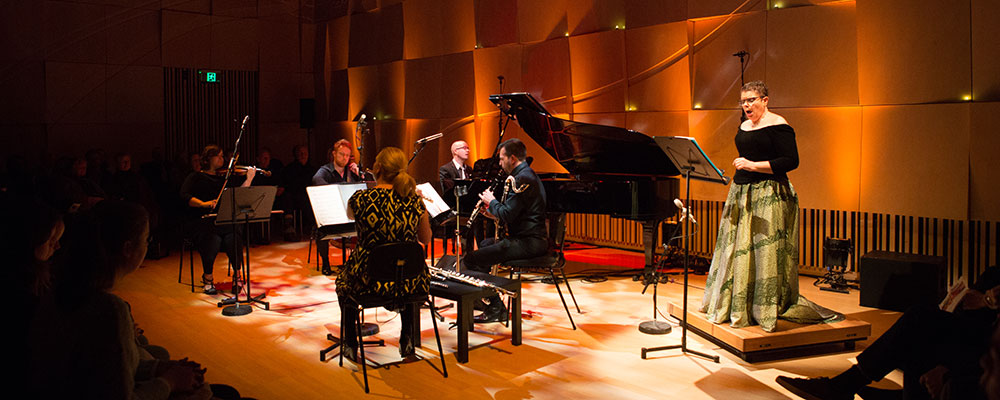
10 Commissions: Deborah Cheetham & Song for Dulka Warngiid
As a musical celebration of the 10th Anniversary of Melbourne Recital Centre, 10 composers have each created a new work to be performed at the Centre throughout 2019.
The 10 composers represent a diverse range of musical styles but are unified by their critical acclaim and dedication to their craft. The series features an outstanding line-up of composers and performers, with each work designed to connect audience and performer in an intimate and personal way, making a significant contribution to the repertoire, across a variety of styles.
The second composer to premiere their composition is Deborah Cheetham AO.
Yorta Yorta woman, Deborah Cheetham AO is a singer, actor, composer, playwright, creator of Australia’s first Indigenous opera Pecan Summer, producer, artistic director and educator. She is passionate about an increased presence for Indigenous music and storytelling in the Centre’s program and has supported its implementation; including through her own performances, and her advice on the Centre’s first Yinga-bul festival and its first Reconciliation Action Plan. Her composition Song for Dulka Warngiid was written through the 2019 Merlyn Myer Music Commission and is inspired by the beautiful tapestry hanging in the Centre’s Level 2 Foyer.
In the 2014 Queen's Birthday Honours List, Deborah was appointed as an Officer of the Order of Australia (AO), for her ‘distinguished service to the performing arts as an opera singer, composer and artistic director, to the development of Indigenous artists, and to innovation in performance’ and in May 2019, she was awarded Life Membership as part of Melbourne Recital Centre's 10th anniversary celebrations.

Notes on Song for Dulka Warngiid:
Dulka Warngiid forms part of the Woven Song series of compositions which respond to Tapestries created by the Australian Tapestry Workshop. Each tapestry is inspired by original artworks by Austrailian Indigenous Artists. In the case of Dulka Warngiid this is the vibrant and holistic work of seven Kaiadilt women.
The combined image forms the geography and cultural story of the Kaiadilt people who have lived their culture on tiny Bentink Island in the Gulf of Carpentaria for more than 2000 generations.
Song for Dulka Warngiid is in seven short movements, each responding to the story of each artist and texture of each area of the art work. Dawn Naranatjil: soft red mudstones from beaches; Paula Paul: shells echo the way women lay cockle shells in pleasing patterns when cooking them; Mrs Gabori: Amazing brightness of the sun on Dingkarri; May Moodoonuthi: Rocks that cover the beach; Amy Loogatha: red of the saltpan and blue of the estuary at Dangkankuru; Netta Loongatha: story place; Ethel Thomas: marrayak the octopus.
The musical influences come directly from the rhythm and texture of both the original painting and the tapestry and the language of the Kaiadilt. In the same way that the contribution of seven artists comes together harmoniously in Dulka Warngiid, I have employed sound palettes which draw on tonal centres which capture the light and colour of the work. A statement by the late Mrs. Gabori forming the central text Danda ngijinda dulk, danda ngijinda malaa, danda ngad - This is my Land, this is my Sea, this is who I am. I have ordered the movements in the way my eye travels around the tapestry/canvas rather than left to right in the conventional reading practice of Western notation or adhering to compass points N-S and E-W of the island.
Deborah was the 2019 recipient of the Merlyn Myer Music Commission, supported by The Aranday Foundation and The Yulgilbar Foundation.
Deborah premiered her new work at Melbourne Recital Centre on Monday 27 May with Syzygy Ensemble.


